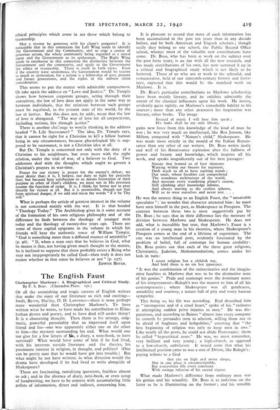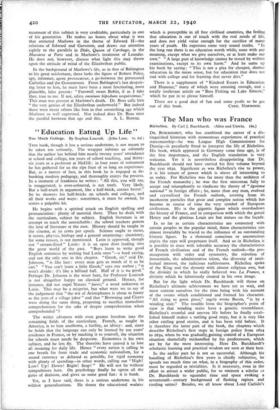The English Faust
Christopher Marlowe : A Biographical and Critical Study. By F. S. Boas. (Clarendon Press. t5s.) OF all the astonishing and tragic careers of English writers that make the story of our literature so rich and exciting— Swift, Byron, Shelley, D. H. Lawrence—there is none perhaps more wonderful than Christopher Marlowe's. To have written what he wrote, to have made his contribution to Eliza- bethan drama and poetry, and to have died still under thirty ! It is a chastening thought. Then there is his strange, enig- matic, powerful personality that so impressed itself upon friend and foe—one was apparently either one or the other to him—the mystery surrounding his end. What would one not give for a few letters of Ss, a diary, a note-book, to have survived? What would have come of him if he had lived, with his interests outside literature and the theatre, his passionate interest in religion, in thought, and politics? (One can be pretty sure that he would have got into trouble.) But what might he not have written; in what direction would the drama have developed if he had lived to write alongside of Shakespeare?
These are fascinating, tantalising questions, fruitless almost to ask ; and in the absence of diary, note-book, or even scrap of handwriting, we have to be content with accumulating little pellets of information, direct and indirect, concerning him. It is pleasant to record that more of such information has been accumulated in the past ten years than in any decade before, and by both American and English scholars ; though really they belong to one school, the Public Record Office school, whence most of the valuable new contributions have come. Dr. Boas, who has been at work on the subject over the past forty years, is au fait with all the new research, and has made contributions of his own, has now summed it up in a critical and biographical study which is not likely to be bettered. Those of us who are at work in the splendid, and remunerative, field of our sixteenth-century history and litera- ture, expected that this would 13: the standard work on Marlowe. It is.
Dr. Boas's particular contributions to Marlowe scholarship have been mainly literary, and he exhibits admirably the extent of the classical influences upon his work. He insists, evidently quite rightly, on Marlowe's remarkable fidelity to his sources ; more than any other dramatist his inspiration was literary, other books. The image
Instead of music I will hear him speak ; His looks shall be my only library,
gains new force from this knowledge of the kind of man he was ; he was very much an intellectual, like Ben Jonson, like Milton, compared with " Nature's child," Shakespeare. He was made more strictly in the mould of the Italian Renais- sance than any other of our writers. Dr. Boas writes justly and well of his Renaissance aspiration after the fullness of
power and beauty and knowledge, which inspires all his work, and speaks magnificently out of his best passages :
Nature that framed us of four elements Warring within our breasts for regiment, Doth teach us all to have aspiring minds ; Our souls, whose faculties can comprehend The wondrous architecture of the world, And measure every wandering planet's course, Still climbing after knowledge infinite, And always moving as the restless spheres, Will us to wear ourselves and never rest. . . .
He was the nearest thing to an English Faust, the " unsatiable
speculator " : no wonder that character attracted him : he must have seen himself in the part, as Shakespeare in Prospero. The contrast between those two is most suggestively put by
Dr. Boas ; he says that in their difference lies the measure of division between Marlowe and Shakespeare. He does not add, what is incredible but true, that Marlowe's Faust is a creation of a young man in his twenties, where Shakespeare's Prospero comes at the end of a lifetime of experience. The cne was an intellectual poet, evidently fascinated by the problem of belief, full of contempt for human credulity : Dr. Boas points out that each of the three great religions, Christianity, Judaism, Mohommedanism, comes under his lash in turn: I count religion but a childish toy, And hold there is no sin but ignorance.
" It was the combination of the ratiocrinative and the imagin- ativd faculties in Marlowe that was to be the distinctive note
of his genius." Pride and contempt were the dominant notes of his temperament—Ralegh's was the nearest to him of all his contemporaries ; where Shakespeare was all gentleness, amiability and courtesy, a nature full of pity and every human sympathy.
This being so, his life was according. Kyd described him as " intemperate and of a cruel heart," spoke of his " rashness in attempting sudden privy injuries to men." He was dis- putatious, and according to Baines " almost into every company he cometh he persuades men to atheism, willing them not to be afraid of bugbears and hobgoblins," asserting that " the first beginning of religion was only to keep men in awe." Like nearly all the poets, he could not abide Protestants ; them he called " hypocritical asses." He was, we must remember,
very brilliant and very young ; a high-church, as opposed to a low-church, unbeliever. It would seem that what his intellectual position came to was a sort of Deism, like Ralegh's paying tribute to a God
that sits on high and never sleeps, Nor in one place is circumscriptible, But everywhere fills every continent With strange infusion of his sacred vigour.
What made Marlowe's difference from ordinary men was his genius and his sexuality. Dr. Boas is as judicious on the latter as he is illuminating on the former ; and his sensible
treatment of this subject is very creditable, particularly in one of his generation. He makes no bones about what it was that attracted Marlowe in the theme -of Edward II—the relations of Edward and Gaveston, and draws our attention rightly to the parallels in Dido, Queen of Carthage, in the Massacre at Paris and in Marlowe's treatment of Leander. He does not, however, discuss what light this may throw upon the attitude of mind of the Elizabethan public.
In the background of Marlowe's life, as in that of Babington to his great misfortune, there lurks the figure of Robert Poley, spy, informer, agent provocateur, a go-between the persecuted Catholics and the Government. From Babington's last despair- ing letter to him, he must have been a most fascinating, most plausible, false person : " Farewell sweet Robin, if as I take thee, true to me. If not, adieu omnium bipedum nequissimus." This man was present at Marlowe's death. Dr. Boas calls him " the very genius of the Elizabethan underworld." But indeed there were many others like him in that astonishing age which Marlowe so well expressed. Nor indeed does Dr. Boas miss the parallel between that age and this. A. L. RowsE.







































 Previous page
Previous page